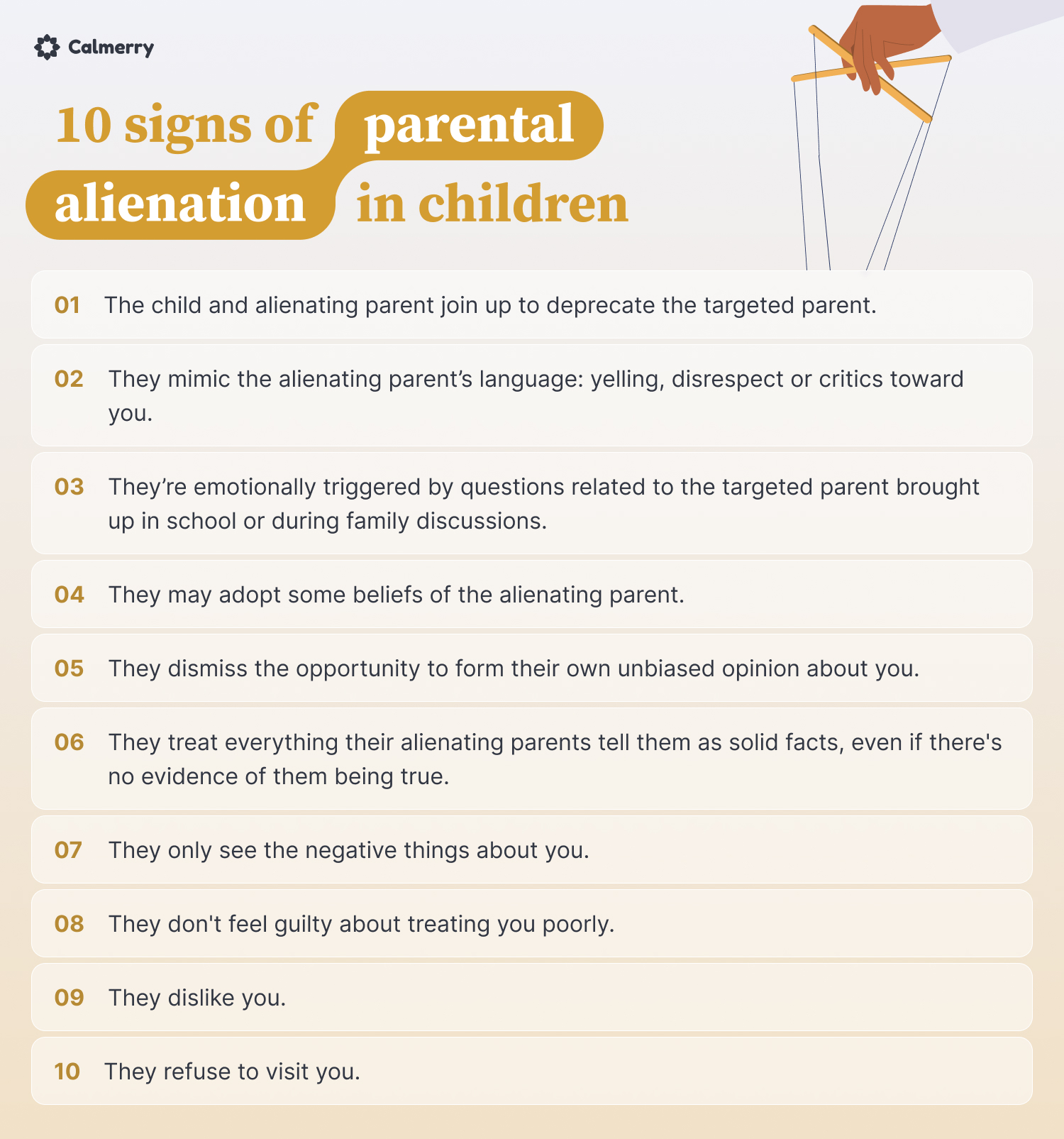Parental Alienation: How to Cope as an Alienated Parent

In this article
Unresolved marital conflicts sometimes snowball into a divorce that segues into parental alienation, which has severe consequences on both the child and the target parent.
Addressing the adverse outcomes of the situation is crucial to protect yours and your child’s well-being and quality of life.
Learn about parental alienation, its impact on target parents, and the workarounds to overcome the problem.
What is parental alienation?
Parental alienation is a process when one of the parents manipulates the child into believing the other parent is bad, unsafe, abusive, or dangerous.
For example, when a couple’s conflict results in divorce, a partner may undermine and speak ill of the other in front of the child.
Divorce disrupts family dynamics, but alienation can also spring from severe marital issues — like abuse or substance use disorder.
Regardless of the cause, straining the relationship between a child and a parent is unacceptable because it harms the well-being of everyone involved.
Learning coping strategies and getting support can help overcome family adversities.
Recognizing 10 signs of parental alienation in children
It may be healthy for a child to have a “favorite” parent without affecting the family dynamics. The case of parental alienation is the opposite since one deceives the child into disliking the other.
Here are 10 indications your child is being influenced in favor of the other parent.
- They dislike you: alienation happens in an estimated 11-15% of divorce cases, with 20-25% of parents engaging in alienating behaviors as long as six years following a divorce. [1] Blotcky, A. D., PhD, & Bernet, W., MD. (2021, November 23). Avoiding the pitfalls of false assumptions in parental alienation cases. Psychiatric Times. https://www.psychiatrictimes.com/view/avoiding-the-pitfalls-of-false-assumptions-in-parental-alienation-cases You’re likely to experience alienation after divorce. Your child may think and assume negative thoughts about you, such as you’re untrustworthy, dangerous and a bad person.
- They mimic the alienating parent’s language: children may parrot how the alienating parent yells, disrespects, or criticizes you.
- They refuse to visit you: after a divorce, they may reject any idea of seeing or visiting you. This rarely comes without reason, especially if your relationship with them before the divorce was strong.
- They may adopt some beliefs of the alienating parent: if they constantly hear about how poor of a person you are, they may unquestionably believe it and dismiss the opportunity to form their own unbiased opinion about you.
- They develop irrational beliefs: since their beliefs are not their own and are acquired and learned from a narcissistic parent, many of them can be false or biased.
- They believe something because they’ve been told it’s a fact: they treat everything their alienating parents tell them as solid facts, even if there’s no evidence that it’s true.
- They only see the negative things about you: they don’t doubt their hatred toward you and think you deserve it.
- They don’t feel guilty about treating you poorly: your child doesn’t show any noticeable regret about their poor treatment of you.
- The child and alienating parent join up to deprecate the targeted parent: it’s now more stressful because you must deal with the hate from the two important people in your life.
- They may be triggered by questions related to the targeted parent: your child may get easily emotionally triggered when topics about you are brought up in school or during family discussions.

Effects of parental alienation on children
The implications for the children and target parents are profound, especially regarding mental health.
Children may doubt their sense of self-perception and feelings and develop rooted insecurity and lack of self-esteem.
The child is deprived of the opportunity to be independent and shape their individuality as the alienating parent pushes their beliefs into them. [2] Verhaar, S., Matthewson, M., & Bentley, C. (2022). The impact of parental alienating behaviours on the mental health of adults alienated in childhood. Children (Basel), 9(4), 475. https://doi.org/10.3390/children9040475
Your young ones may develop an increased vulnerability to mental health issues, like anxiety, depression, eating and feeding disorders, PTSD, and psychosomatic disorders.
Effects of parental alienation on a targeted parent
Target parents experience mental health distress stemming from their poor relationships with their kids. The profound impact of being alienated takes a toll on their psychological well-being.
1. They endure a range of negative emotions
Targeted parents experience 6 out of 16 discrete emotions, including frustration, anger, guilt, shame, distress, and sadness. [3] Lee-Maturana, S., Matthewson, M., & Dwan, C. (2021). Ten Key Findings on Targeted Parents’ Experiences: Towards a Broader definition of Parental Alienation. Journal of Family Issues, 43(10), 2672–2700. https://doi.org/10.1177/0192513×211032664 Some parents may concede and accept they have done something wrong despite the opposite being true.
2. They struggle with intense feelings of loss and grief
In a study revealing the top findings on targeted parents’ experience, most reported feeling ambiguous loss and grief that no one understands or supports.
Their children are physically alive but psychologically missing – similar to emotions when a loved one is in a coma or has Alzheimer’s disease. The feeling results in denial, anger, depression, and other symptoms.
3. Their mental health suffers
Out of 54 self-referred targeted parents, 23% reported they attempted to end their own lives. [4] Lee-Maturana, S., Matthewson, M., & Dwan, C. (2020). Targeted parents Surviving Parental alienation: Consequences of the alienation and coping strategies. Journal of Child and Family Studies, 29(8), 2268–2280. https://doi.org/10.1007/s10826-020-01725-1
Children often can’t understand the emotional impact their actions can have on a parent, but the effects can be devastating.
Parents care so much about their children’s opinions, so receiving indifference takes a massive toll on their mental health.
Addressing parental alienation in 4 ways
Parental alienation is a form of domestic violence in which alienating parents exert control over their child or the other person.
There are four main ways to address it.
1. Rebuilding trust and connection with your kid
What should you do as a targeted parent if your kid is rejecting you? Since there’s no one-size-fits-all approach for each case of alienation, methods for restoring family dynamics vary.
One strategy is to assess yourself, your children, and your ex-partner and document scenarios and behaviors leading to abuse.
Just as the other controls the child’s actions, you have the same power to change the circumstances if you know why and how they happen:
- For instance, if your child disrespects you because they see your ex-partner do so, write this down.
- Initiate a discussion and reference your notes to share observations about your child’s behaviors.
- Don’t hesitate to take a solid parental role. Take responsibility and get your concerns across by facing the situation head-on through open communication.
Meanwhile, work on building a loving connection with your child.
Spend time with them, engage in activities that strengthen your bond, and actively participate in their lives. It may be challenging at first, but eventually, your relationship with them will move in the right direction.
2. Coping with new family dynamics
If divorce is imminent, a healthy co-parenting relationship is highly possible.
Here are some strategies to nurture a supportive parental environment for your child and minimize conflict.
- Be honest and open to parenting discussions and decisions, including when a child experiences loyalty conflicts.
- Develop a routine for your young one. It helps create a sense of security and predictability.
- Respect your ex-partner and their parenting style.
- Be consistent in your approach to raising your child. Establish standard rules for addressing negative behaviors.
- Stay flexible and adaptive. Modify these rules and approaches, as it may take some time for a child to accept their reality, especially regarding a stepfamily.
3. Navigating legal considerations
Taking legal action is your last straw if you wish to secure the welfare of the child, but a peaceful discussion and third-party mediation fail. The challenge with this option is it’s difficult to prove you’re being alienated.
The first step toward taking legal action is to gather actual evidence of parental alienation. [5] Law, L. T., & Taylor, L. (2020, December 26). Divorce during the COVID-19 pandemic. Lauren Taylor Law. https://laurentaylorlaw.com/parental-alienation-and-child-custody-in-south-carolina/ This can involve having witnesses testify about the behavior and collecting electronic communication, such as texts and social media posts.
– Jack Shaw, Senior writer of the men’s lifestyle publication Modded
Courts may reinforce your rights as a parent, potentially even going as far as to modify your child custody arrangement. The trouble here is that court battles are rarely quick or simple and may result in additional stress on both you and your child.
4. Seeking professional mental health help
Research proved parental alienation has long-term effects on children that they can carry into adulthood. [2] Verhaar, S., Matthewson, M., & Bentley, C. (2022). The impact of parental alienating behaviours on the mental health of adults alienated in childhood. Children (Basel), 9(4), 475. https://doi.org/10.3390/children9040475
Twenty adults who were exposed to such a situation developed mental health problems, including the following:
- Depression and anxiety
- Eating disorders or body image issues
- Personality disorders,
- Fear of abandonment
- Need for validation from others
- PTSD
- Psychosomatic symptoms in the likes of chronic fatigue, cognitive fog, and fibromyalgia
- ADHD
- Self-harm
- Suicidal ideation
- Substance use disorder
Mental health interventions can help cope with the problems created by the situation.
Therapists have criteria to determine the level of alienation, whether mild, moderate, or severe. [6] Family therapy of the moderate type of parental alienation syndrome. (n.d.). http://fact.on.ca/Info/pas/gard99m.html
It’s best to sign your child up in therapy even if they don’t manifest symptoms to teach them coping skills and cope with the impact of alienation before they carry it into adulthood.
Therapy options for targeted parents
In most cases, targeted parents feel anxious, angry, and depressed due to extreme distress. These are giveaway signs they need support from a mental health professional.
Therapy can be a valuable resource for alienated parents who are dealing with the emotional and psychological challenges of being separated from their children.
Here are some ways therapy can help:
- A therapist can provide a safe space for parents to express and process these emotions.
- Therapists can help alienated parents develop healthy coping mechanisms.
- A therapist can teach techniques for active listening, assertive communication, and conflict resolution.
- Parental alienation can be a traumatic experience, and therapy can help parents work through the psychological impact of this trauma.
- While the primary focus may be on the alienated parent-child relationship, therapy can also help parents strengthen other important relationships in their lives, such as with family members, friends, or a new partner.
- Alienated parents may struggle with feelings of self-doubt, inadequacy, and low self-esteem. Therapy can help parents prioritize self-care and develop a healthier sense of self-worth.
If you’re ready, we have online therapists experienced in working with a parent going through parental alienation and your unique challenges.
Start on Calmerry with a brief survey – and get matched with your therapist within 1 hour.
Summing up
If this resonates with you, put a higher priority on your and your child’s well-being to mitigate the adverse consequences of alienation.
Seek help and support for yourself from extended family and mental health experts.
If push comes to shove, work with a family attorney.
Maintaining a healthy relationship and your well-being is critical for all involved, and the hard work will be well worth it.
Blotcky, A. D., PhD, & Bernet, W., MD. (2021, November 23). Avoiding the pitfalls of false assumptions in parental alienation cases. Psychiatric Times. https://www.psychiatrictimes.com/view/avoiding-the-pitfalls-of-false-assumptions-in-parental-alienation-cases
Verhaar, S., Matthewson, M., & Bentley, C. (2022). The impact of parental alienating behaviours on the mental health of adults alienated in childhood. Children (Basel), 9(4), 475. https://doi.org/10.3390/children9040475
Lee-Maturana, S., Matthewson, M., & Dwan, C. (2021). Ten Key Findings on Targeted Parents’ Experiences: Towards a Broader definition of Parental Alienation. Journal of Family Issues, 43(10), 2672–2700. https://doi.org/10.1177/0192513×211032664
Lee-Maturana, S., Matthewson, M., & Dwan, C. (2020). Targeted parents Surviving Parental alienation: Consequences of the alienation and coping strategies. Journal of Child and Family Studies, 29(8), 2268–2280. https://doi.org/10.1007/s10826-020-01725-1
Law, L. T., & Taylor, L. (2020, December 26). Divorce during the COVID-19 pandemic. Lauren Taylor Law. https://laurentaylorlaw.com/parental-alienation-and-child-custody-in-south-carolina/
Family therapy of the moderate type of parental alienation syndrome. (n.d.). http://fact.on.ca/Info/pas/gard99m.html
online therapy
live video session



